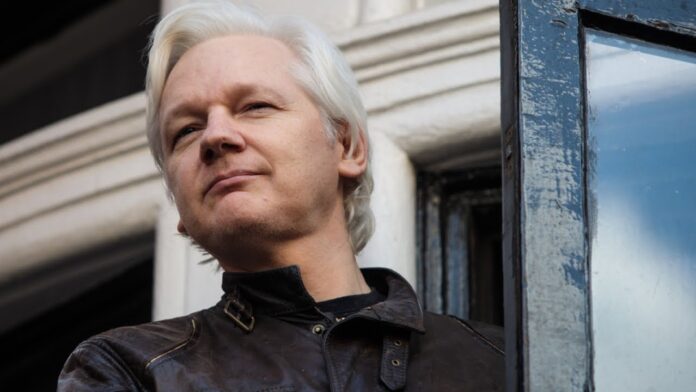WikiLeaks founder Julian Assange departs UK for Australia following plea deal with US, ending a 12-year legal saga
Julian Assange, founder of WikiLeaks, concluded his lengthy legal battle with the United States on Monday by leaving the United Kingdom and heading back to his homeland, Australia. This landmark moment follows years of extradition disputes and legal challenges stemming from Assange’s publication of classified US government documents through WikiLeaks.
Assange, aged 52, had been detained in a high-security UK prison for the past five years, preceded by seven years of self-imposed confinement at the Ecuadorian embassy in London. His time at the embassy was aimed at avoiding extradition to Sweden over sexual assault allegations, which he denied, and subsequently, extradition to the US for his role in leaking sensitive military and government materials.
The plea deal reached with the US Justice Department allowed Assange to plead guilty to a felony charge related to the publication of classified documents. In return, he faces a sentencing hearing in Saipan, a US territory in the Pacific, with an expected 62-month sentence, equivalent to his time served in UK custody.
Assange’s departure from the UK was confirmed by WikiLeaks, stating he left Belmarsh maximum security prison after spending 1,901 days there. The agreement ensures he won’t be extradited to the US mainland, addressing concerns about fair trial guarantees and human rights violations.
The legal saga began in 2010 when WikiLeaks published hundreds of thousands of confidential US military documents provided by Chelsea Manning, a former Army intelligence analyst. These leaks included video footage depicting a US helicopter attack in Iraq, which Assange described as evidence of war crimes committed by US-led forces.
Throughout his ordeal, Assange and supporters argued the case was politically motivated and a threat to press freedom. Advocacy groups, including Amnesty International and the UN special rapporteur on torture, criticized attempts to extradite Assange, citing potential abuses and mistreatment.
Assange’s return to Australia is expected following the sentencing hearing in Saipan, reflecting his status as an Australian citizen and the conclusion of his legal obligations under the plea deal.
Analysis:
- Political: Assange’s case intersects with global politics, highlighting tensions between national security interests and press freedom. The negotiated plea deal allows the US government to assert legal accountability while avoiding the contentious issue of extraditing Assange, which could have strained diplomatic relations.
- Social: Assange’s legal battles sparked debates about transparency, whistleblowing, and the limits of government secrecy. Supporters view him as a whistleblower exposing wrongdoing, while critics argue his methods jeopardized national security. His case raises questions about the role of journalism in holding governments accountable and the ethical dilemmas of handling classified information.
- Legal: Legal scholars scrutinize the plea deal’s implications for future cases involving whistleblowers and publishers of classified information. The agreement’s terms, including matching time served with the expected sentence, represent a compromise aimed at resolving a complex legal and diplomatic standoff.
- International Relations: Assange’s extradition battle strained relations between the US, UK, and Ecuador, illustrating challenges in balancing diplomatic obligations with individual rights. The involvement of international human rights organizations and political leaders reflects concerns over due process and extraterritorial legal jurisdiction.
- Media and Press Freedom: Press freedom advocates closely monitored Assange’s case, fearing a precedent that could suppress investigative journalism and the protection of journalistic sources. The plea deal’s avoidance of extradition may be seen as a partial victory for press freedom, though questions remain about its broader impact on media ethics and legal protections.
